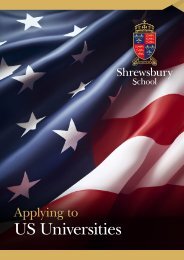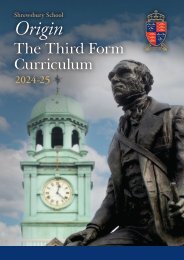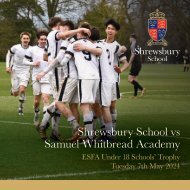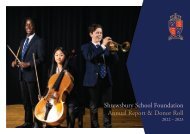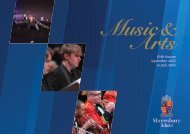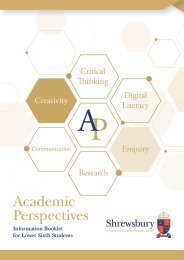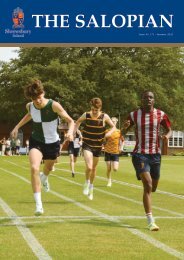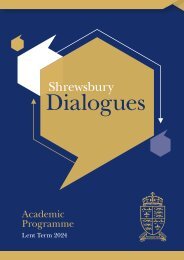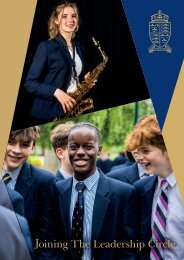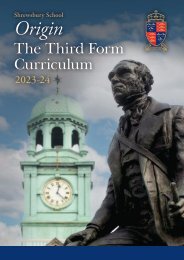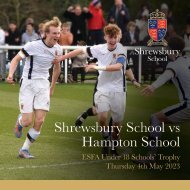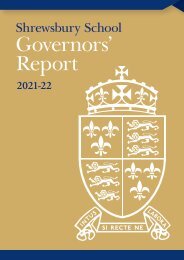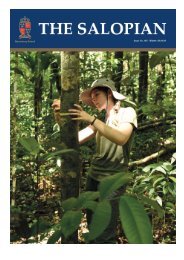The Salopian - Winter 2021
Create successful ePaper yourself
Turn your PDF publications into a flip-book with our unique Google optimized e-Paper software.
SCHOOL NEWS 7<br />
In both years, commentators remarked<br />
that the results were ‘inflated’. This<br />
is true in the sense that the overall<br />
distribution of grades was significantly<br />
higher than in previous years and<br />
under the traditional test format.<br />
However, the two systems were totally<br />
different; so the grades are ‘different’<br />
rather than ‘inflated’. Assuming the<br />
professional integrity and accuracy<br />
of schools, the children got their best<br />
results. <strong>The</strong>ir ‘fairest’ possible results.<br />
On a local level, I was deeply proud<br />
of the professionalism and dedication<br />
of our academic staff at Shrewsbury<br />
in managing both exam sessions so<br />
expertly. And the adaptability of pupils<br />
and steadfastness of their parents too.<br />
<strong>The</strong> A Level outcomes saw well over<br />
90% of <strong>Salopian</strong>s leave to their first<br />
choice university.<br />
What will Summer 2022 bring? Well,<br />
plan A is the return of the ‘five-day<br />
test’ format, pretty much as we know<br />
it of old. That is, exams under timed<br />
conditions in silent halls. Papers in<br />
specific subjects will be spaced ten<br />
days apart to allow for absence due<br />
to a positive PCR (that other kind of<br />
test). Some adaptations will be made<br />
to enhance the playing surface: the<br />
heavy roller. All the batswomen will<br />
have some idea of the kind of bowler<br />
they will be facing – some advance<br />
information will be provided. If, for<br />
some extraordinary reason, the cricket<br />
season is cancelled (that is, the exam<br />
session is called off), then existing<br />
data will be used to calculate grades –<br />
another variant on 2020 and <strong>2021</strong>. Not<br />
quite a T20 or <strong>The</strong> Hundred, but grades<br />
would again be awarded by a potted<br />
version of exams that relies on teacher<br />
judgment. However, plan A is very much<br />
the favoured and expected eventuality for<br />
Summer 2022.<br />
Perhaps most interestingly, the recent<br />
mobility of the examination system has<br />
freed up conversations about alternative<br />
modes of assessment. This is really<br />
interesting territory. Why is the threehour<br />
exam the best and fairest way<br />
to assess attainment? It’s probably the<br />
easiest to moderate and standardise.<br />
But is it the most subtle? Of course not.<br />
Surely a range of softer methods, such<br />
as interviews and practical challenges<br />
would generate a more rounded<br />
sense of a person’s capability. Exams<br />
only develop and reward a narrow<br />
bandwidth of skills. How might we<br />
test empathy? Yet, we all know that<br />
the ability to listen or the aptitude for<br />
collaboration are vital life skills.<br />
<strong>The</strong> Rethinking Assessment movement<br />
argues that the cancellation of exams<br />
provides a break in play and that<br />
educators should seize the opportunity<br />
to change the rules of the game. <strong>The</strong>y<br />
argue that “exams have a stranglehold on<br />
our entire education system. […] Many<br />
young people find the way our exam<br />
system works increasingly stressful and<br />
not a true reflection of what they can do<br />
or are good at. <strong>The</strong> arms race for grades is<br />
brutal, and the notion of ‘raising standards’<br />
redundant; the GCSE system necessitates<br />
that the bottom third fail. Headteachers feel<br />
that high stakes exams distort priorities and<br />
stop them from providing a well-rounded<br />
education for their pupils. Our assessment<br />
system is not giving universities, colleges<br />
or employers the kind of information<br />
they want, nor evidencing the kinds of<br />
dispositions and capabilities which help<br />
young people to succeed at school and<br />
in life.”<br />
<strong>The</strong> issues raised here are too many<br />
and too complex to address in a short<br />
article. Whilst many will share the<br />
sense that there is an opportunity to<br />
rethink assessment, it is a massive<br />
project. Some will say that the energy<br />
for revolution is simply not there.<br />
Others will argue that the exam system<br />
is not perfect, but the best available.<br />
Others still will question why we<br />
need examinations at age 16 when<br />
all children need to remain in school<br />
or training until the age of 18. Still<br />
more will trumpet the merits of the<br />
IB or other systems. (In my view,<br />
the IB attempts to certify a wider<br />
but still incomplete slice of what we<br />
call whole person education. <strong>The</strong><br />
combination of A Levels, EPQ and<br />
Institute of Leadership and Management<br />
Diplomas and all the non-assessed<br />
personal development of a Shrewsbury<br />
education is a far superior dashboard.)<br />
What seems apparent is that universities<br />
and employers are looking further and<br />
further beyond examination grades.<br />
Our pupils need to be delivering their<br />
best in the exam hall, but this is only<br />
one aspect of their performance; one<br />
set of skills. To return to cricket: it is<br />
not just the performance on the pitch, it<br />
is the pre-match interview, the response<br />
to defeat, the wider business of how<br />
you lead your life between games.<br />
<strong>The</strong> only examination to assess the full<br />
fruits of whole person education is life<br />
itself. Not quite a timeless test, but a<br />
very long, multi-format series in which<br />
each player needs to build and play<br />
to a wide variety of aptitudes. And to<br />
approach each game with a spirit of<br />
serious fun.<br />
Leo Winkley<br />
<strong>The</strong> Headmaster’s house, c 1800



